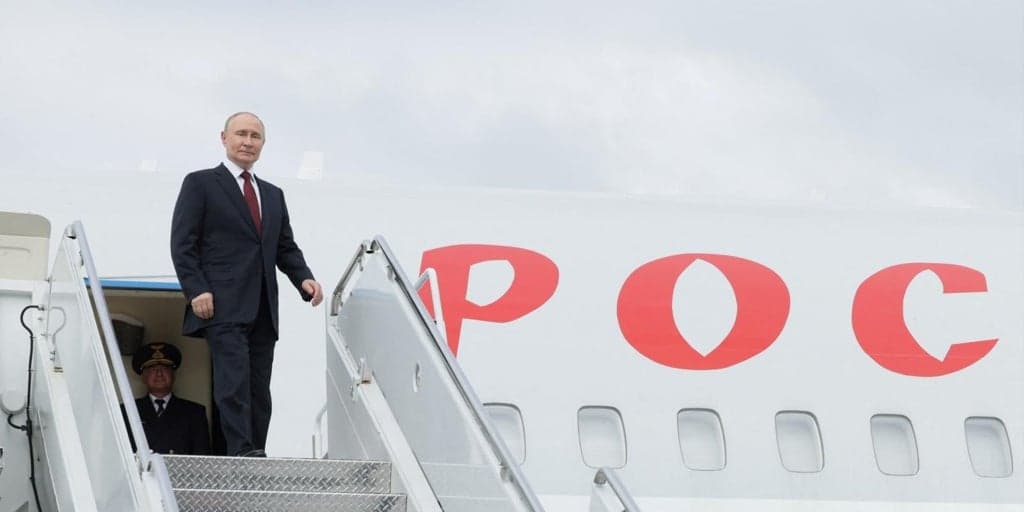editorial
The US president accepts the Kremlin's narrative framework in Ukraine and thus weakens Western pressure. The summit leaves an image of legitimizing the aggressor.
The summit between Donald Trump and Vladimir Putin in Alaska will go down in history not for the agreements reached—as far as we know, none existed—but for the scene it presented to the world: a Russian president accused of serious war crimes received with honors on U.S. soil while his aggression against Ukraine continues. There was no truce, not even a promise to reduce the violence. But there was applause, a red carpet, and a disturbing sense of diplomatic imbalance.
Putin arrived in Anchorage with the clear objective of redrawing the framework for the negotiations: rejecting any unconditional ceasefire and shifting responsibility for the conflict to Ukraine and its allies. Judging by the outcome, he succeeded. At the end of just three hours of meeting, Trump informed NATO leaders and Volodymyr Zelensky that the Russian leader does not want a truce, but rather a comprehensive agreement that addresses the root causes of the war. In this way, Putin has managed to introduce, with Trump's help—voluntary or involuntary—his narrative into Washington's discourse.
What the Kremlin understands by root causes is well known: NATO expansion, Ukraine's desire to integrate into the West, and the military and economic support it has received from Europe and the United States. Under this logic, the war is not Russian aggression, but a legitimate reaction to a supposed strategic encirclement. That Trump has begun to speak in these terms—leaving aside, at least for now, his promise of severe consequences if a ceasefire is not reached—indicates a worrying shift in his view of the conflict.
The American president bet everything on his style: a personal, unscripted approach, confident in his persuasiveness and chemistry with his interlocutor. In fact, he described the meeting as warm. But the setting was not conducive to that kind of informality. Putin is not Kim Jong-un or a rival of circumstance: he is an autocrat trained in the discipline of the KGB, with years of experience recruiting collaborators and shaping scenarios to his advantage. His ability to use the solemnity of the moment, the weakness of his opponent, and ambiguity as a tool of power was once again evident. Putin melted Trump's ego by publicly stating that without Biden in the White House, he would not have invaded Ukraine, and forced him to align with his narrative by asserting that the 2020 elections were rigged with mail-in voting. The phrase"mail-in voting is incompatible with democracy" will resonate not only with Trump's supporters, but also with many right-wing and far-right voters around the world.
In the midst of the invasion of Ukraine, seeing Putin walking on a red carpet, flanked by an honor guard, not only offends the victims of the conflict, it also disorients the allies and gives Russia exactly what it has been seeking for months: legitimacy. The Russian leader didn't even flinch at the calculated staged flyover of a B-1 escorted by four F-35s overhead. The Anchorage photo will be celebrated in Moscow as a diplomatic victory. The message is clear: the Kremlin can continue the war and, at the same time, sit at the table of the powerful as if nothing were happening.
The summit ended without results, but its effects will be long-lasting. The decision not to demand a truce, to accept the rhetoric of root causes, and to postpone the punitive measures Trump had promised leaves Ukraine in a more vulnerable position. kyiv watches as its fate is discussed without its direct participation, while the burden of facilitating peace is implicitly transferred to it. As Deputy Chairman of the Russian Security Council, Dmitry Medvedev, summed up, the responsibility now falls on Ukraine and Europe.
And yet, not all is lost. The summit's failure has generated such low expectations that any subsequent progress—no matter how modest—can be presented as a success. If Zelensky manages to mobilize European support, set clear conditions, and assert his voice, he could regain some of the initiative. In that sense, Trump's faltering stance opens a window for a more assertive strategic response from the Western front. But it will be a race against time. Putin has gained time, influence, and visibility. He has shown that he can continue bombing while negotiating. And, most dangerously, he has managed to get an American president to start speaking in his own terms because his interests lie elsewhere.

